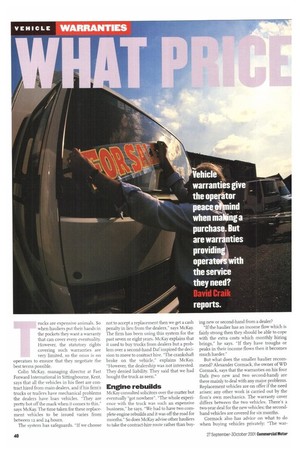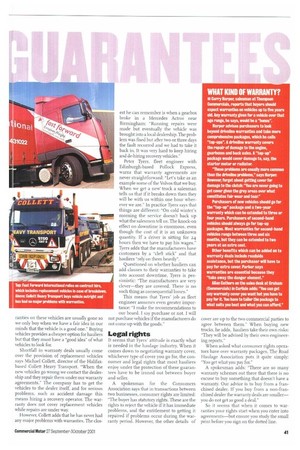rucks are expensive animals. So when hauliers put their hands
Page 40

Page 41

If you've noticed an error in this article please click here to report it so we can fix it.
in the pockets they want a warranty that can cover every eventuality. However, the statutory rights covering such warranties are very limited, so the onus is on
operators to ensure that they negotiate the best terms possible.
Cohn McKay, managing director at Fast Forward International in Sittingbourne, Kent, says that all the vehicles in his fleet are contract hired from main dealers, and if his firm's trucks or trailers have mechanical problems the dealers have loan vehicles. "They are pretty hot off the mark when it comes to this," says McKay. The time taken for these replacement vehicles to be issued varies from between 12 and 24 hours.
The system has safeguards. "If we choose not to accept a replacement then we get a cash penalty in lieu from the dealers," says McKay. The firm has been using this system for the past seven or eight years. McKay explains that it used to buy trucks from dealers but a problem over a second-hand Daf inspired the decision to move to contract hire. "The crankshaft broke on the vehicle," explains McKay. "However, the dealership was not interested. They denied liability. They said that we had bought the truck as seen."
Engine rebuilds
McKay consulted solicitors over the matter but eventually "got nowhere". "The whole experience with the truck was such an expensive business," he says. We had to have two complete engine rebuilds and it was off the road for months." So does McKay advise other hauliers to take the contract-hire route rather than buy ing new or second-hand from a dealer?
"If the haulier has an income flow which is fairly strong then they should be able to cope with the extra costs which monthly hiring brings," he says. "If they have troughs or peaks in their income flows then it becomes much harder."
But what does the smaller haulier recommend? Alexander Cormack, the owner of WD Cormack, says that the warranties on his four Dots (two new and two second-hand) are there mainly to deal with any major problems. Replacement vehides are on offer if the need arises: any other work is carried out by the firm's own mechanics. The warranty cover differs between the two vehicles. There's a two-year deal for the new vehicles; the secondhand vehicles are covered for six months.
Cormack also has advice on what to do when buying vehicles privately: "The war rarities on these vehicles are usually gone so we only buy when we have a fair idea in our minds that the vehicle is a good one." Buying vehicles provides a cheaper option for hauliers but that they must have a "good idea" of what vehicles to look for.
Shortfall in warranty deals usually come over the provision of replacement vehicles says Michael Collett, director of the Halifaxbased Collett Heavy Transport. When the new vehicles go wrong we contact the dealership and they repair them under our warranty agreements." The company has to get the vehicles to the dealer itself, and for serious problems, such as accident damage this means hiring a recovery operator. The warranty does not cover replacement vehicles while repairs are under way.
However, Collett adds that he has never had any major problems with warranties. The clos est he can remember is when a gearbox broke in a Mercedes Actros near Birmingham: "Running repairs were made but eventually the vehicle was brought into a local dealership. The problem was fixed but after two or three days the fault recurred and we had to take it back in. It was very hard to keep hiring and de-hiring recovery vehicles."
Peter Tyers, fleet engineer with Edinburgh-based Pollock Express, warns that warranty agreements are never straightforward: "Let's take as an example some of the Volvos that we buy. When we get a neW truck a salesman tells us that if it breaks down then they will be with us within one hour wherever we are." In practice Tyers says that things are different: "On cold winter's morning the service doesn't back up what the salesmen tell us. The knock-on effect on downtime is enormous, even though the cost of it is an unknown quantity. If a driver is sitting for 24 hours then we have to pay his wages." Tyers adds that the manufacturers have customers by a "cleft stick' and that hauliers "rely on them heavily".
Questioned on whether hauliers can add clauses to their warranties to take into account downtime, Tyers is pessimistic: "The manufacturers are very clever—they are covered. There is no such thing as consequential losses."
This means that Tyers' job as fleet engineer assumes even greater importance: "I make the recommendations to our board. I say purchase or not. I will not purchase vehicles if the manufacturers do not come up with the goods."
Legal rights
It seems that Tyers' attitude is exactly what is needed in the haulage industry. When it conies down to negotiating warranty cover, whichever type of cover you go for, the consumer and legal rights that most hauliers enjoy under the protection of these guarantees have to be ironed out between buyer and seller.
A spokesman for the Consumers Association says that in transactions between two businesses, consumer rights are limited: "The buyer has statutory rights. These are the rights to reject the vehicle if it has immediate problems, and the entitlement to getting it repaired if problems occur during the warranty period. However, the other details of cover are up to the two commercial parties to agree between them." When buying new trucks, he adds, hauliers take their own risks: "They will be advised by their own engineering reports."
When asked what consumer rights operators have over warranty packages, The Road Haulage Association puts it quite simply: "You get what you pay for."
A spokesman adds: "There are so many warranty schemes out there that there is no excuse to buy something that doesn't have a warranty. Our advice is to buy from a franchised dealer. If you buy from a non-franchised dealer the warranty deals are smaller— you do not get as good a deal."
So it seems that when it comes to warranties your rights start when you enter into agreements—but ensure you study the small print before you sign on the dotted line.




































































































































